A Complete Guide to Hybrid App Development
1 Apr 21 

$143 billion! That’s the total consumer spend on mobile applications in 2020 alone.
In the past 12 months, mobile adoption has advanced 2-3 years.
With 20% growth year over year, the consumer spent has reached new heights in 2021.
Investment in mobile solutions is an intelligent move at this juncture.
But, mobile app development is like a vast tree. There are several branches to it, and they are constantly evolving.
In this blog, we are going to take a look at hybrid app development — a popular mobile app development technology that is growing in trend.
So without further ado, let’s get started.
What is a Hybrid Mobile App
Mobile apps can generally be categorized into three types- native apps, web apps, and hybrid apps.
Native apps are specific to a particular platform. They are written in the native development language and compiled using platform-specific tools. So a native app cannot run on platforms other than its parent platform. These apps have to be downloaded from the specific app stores.
On the other hand, web apps need no download and can be accessed through browsers like Chrome, Firefox, etc. They are built using HTML, CSS, and Javascript. Web apps can run on multiple platforms with a single code base.
Hybrid mobile apps are a combination of native apps and web apps. They are written in HTML, CSS and Javascript and wrapped using a native “wrapper”. This enables them to be used like native apps, which can be downloaded from app stores. And they are not restricted to any particular platform!
What is Hybrid App Development
Hybrid app development is the process of developing a single application that can run on different operating systems, like Android, iOS, and Windows.
We can look at hybrid app development as a two-part process.
- The coding of the application using languages like HTML, CSS, and Javascript.
- The “wrapping” of the application using open source frameworks like React Native or Apache Cordova.
Hybrid app development is a great way to overcome the limitations of web apps while replicating the behaviour of native apps. Essentially, hybrid apps are web apps with added native features.
How Do Hybrid Apps Work
The soul of the hybrid apps is the backend code written in web technologies. Its body is the native shell. This native shell takes the role of a bridge that connects the code to different platforms.
For each platform, the app is run through its embedded browser rather than the web browser. This happens from within the native shell and is invisible to users. The WebView feature is used to perform the embedding.
Further, plugins are used to enable complete access to a device’s capabilities. So, accessing a device’s camera, Bluetooth, GPS, etc., can be achieved by installing plugins. Thus, plugins help hybrid apps behave like native apps and overcome the limitations of web apps.
And the native shells make it easy to create a native interface by providing a set of UI components. They act as building blocks of hybrid apps and make them on par with native apps in terms of look and feel.
What are the Top 9 Benefits of Hybrid App Development
Hybrid app development is quite popular as it offers several benefits for businesses.
It is a very feasible option for mobile app development that offers the perfect balance between cost-effectiveness and functionality.
Let us look at the nine benefits that it provides.
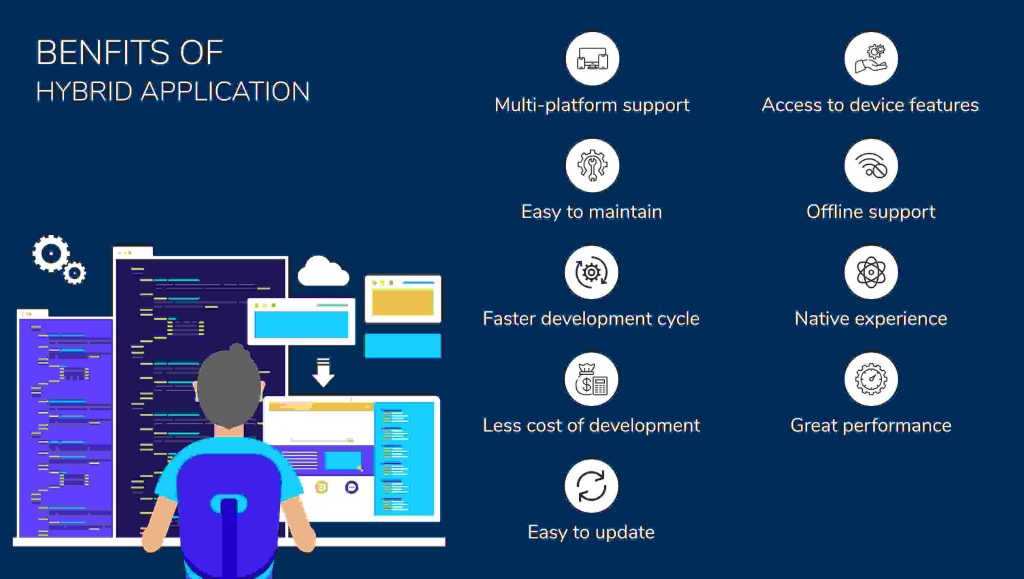
1. Multi-Platform Support
Hybrid apps have multi-platform support, as you would have already understood from our discussions so far.
It uses a single code base and can easily be scaled for other platforms. Once you have created an app for one platform, say Android, it can be launched on other platforms like iOS and Windows without much difficulty.
2. Easy to Maintain
Since there is only a single codebase, the ease of maintenance is incredible. Only one database has to be managed, no matter how many platforms the app runs. Further, HTML codes are relatively easy to maintain.
3. Faster Development Cycle
Hybrid application development is fast compared to native app development due to the single codebase advantage. In fact, hybrid apps would only require half the development time of native apps.
This offers a great benefit for businesses as they can release an MVP in a short period. This helps them reach the market soon and gives them a competitive advantage.
4. Less Cost of Development
With hybrid app development, there is no need to spend on building different apps for different platforms. This reduces the cost of development to a great extent.
Further, the time required for development and the number of developers is also less, which cuts down the cost again.
And even the maintenance cost is also not much concerning, as it requires management of only a single codebase. Thus hybrid apps are a perfect choice for small businesses who want to develop mobile apps on a limited budget.
5. Access to Device Features
A significant disadvantage of web apps was that they couldn’t access the features of a device, like the address book, camera, etc. Hybrid apps overcome this disadvantage.
Just like native apps, hybrid apps can access device features. This is possible with the help of the app development framework and the related plugins.
6. Offline Support
One of the great benefits that hybrid apps offer is offline availability. It is very useful in situations like constant travelling or unstable network connectivity.
Hybrid apps can store data locally. It enables them to load the app with previously loaded data. So even though users may not be able to access real-time data, they can still use hybrid apps in an offline mode.
7. Native Experience
Hybrid apps provide a near-native experience to its users. Its performance is consistent and offers excellent fluidity across various platforms. It succeeds in delivering a seamless user experience to users.
8. Great Performance
When it comes to performance, hybrid apps are faster than both responsive and progressive web apps. Since they are lightweight, app loading happens super fast. And their independence with the network for loading further accentuates the performance.
9. Easy to Update
For native applications, an app update is a critical factor for both developers and users to experience the best performance of the app. Updates take time and can sometimes be a headache.
With hybrid app development, updating is as simple as refreshing a web page. This makes it easy to implement modern mobile app development trends, access the latest versions, making maintenance simple.
10 Most Popular Hybrid App Development Frameworks
As hybrid apps are rising in trend, several hybrid app frameworks have emerged to meet the needs.
These frameworks have become so trusted and valuable to developers worldwide. Hybrid app development has become a go-to solution for leading companies globally due to the versatility of the frameworks.
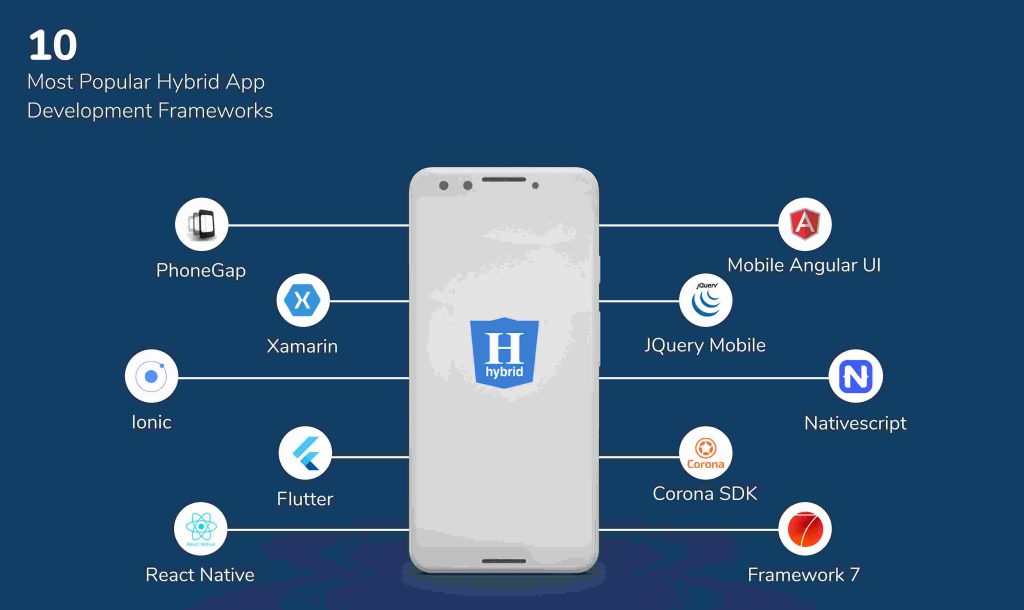
Let’s take a look at the ten most famous hybrid mobile app development frameworks.
1. React Native
The majority of developers’ choice, React Native, is a widely used framework for building hybrid applications. Developed by Facebook, it’s based on React and Javascript. Both Android and iOS apps can be developed from a single codebase.
It is easy to learn, even for beginners and makes the development of a native UI simple. React native app development is the preferred choice of several top-notch businesses today.
Features:
- Provides hot deployment functionality
- Huge support community of developers
- Excellent third party plugin integration
2. Flutter
Flutter is a UI toolkit created by Google that aids app development for mobile, desktop, and web. Though it was only released in 2017, it has gained tremendous acceptance as a cross platform app development tool in the developer community. It is growing to be excellent competition for React Native framework.
It is well known for the extensive range of customized widgets that it offers, making Flutter application development fast. Further, it is an open-source technology and hence is accessible to all developers.
Features:
- Provides excellent widget support
- Real-time updates due to hot reload functionality
- Reduced code development time
3. Ionic
Ionic is one of the most used hybrid app development frameworks. It is a free and open-source SDK, which uses web technologies CSS and Javascript. Ionic supports app development on Android, iOS, and Windows.
It has several built-in UI components like forms, action sheets, etc., which help develop a native UI. It also has extensive tools for testing and debugging.
Features:
- Platform independent
- Quick development
- Highly scalable
4. Xamarin
Based on .NET, Xamarin is an open-source framework owned by Microsoft. It is a very feature-rich platform that offers several tools and libraries to build hybrid apps. It supports code sharing and is suitable for Android, iOS, and Windows. Using its native UI elements, it offers an experience that is truly rich and gives a native feel.
Features:
- Excellent community support
- Simplified testing process
- Easy API integration
5. PhoneGap
Adobe Phonegap allows app development using programming languages for mobile apps like HTML, CSS and Javascript. It has a very low learning curve and is suitable for beginners. It is compatible with all platforms and allows code reusability. With its extensive API integration, developing hybrid apps on Phonegap is quick and easy.
Features:
- No hardware restrictions
- Wide range of plugins and third-party tools
- Great support system
6. Mobile Angular UI
Mobile Angular UI is a responsive framework that works without any jQuery dependency. It is independent of external libraries and extensions. To create an attractive user interface, the framework provides several UI components like overlays, switches, sidebars, etc.
Features:
- It is lightweight
- Full-fledged developer platform
- Has cross-browser compatibility
7. JQuery Mobile
JQuery mobile is an HTML based development framework that supports the building of mobile and web applications for various platforms. It is unique in the way that it does not stick to template designs and lets developers define app elements. The framework suppers various plugins like content slider, image slider, etc., to create an interactive design.
Features:
- It is lightweight
- Has add ons for creating custom themes
- Responsive framework
8. Nativescript
It is a hybrid app development framework known for its shorter development time and reduced development cost. Nativescript is an open-source framework that is based on Angular, Typescript, Vue.js or Javascript. It offers excellent integration features, which makes it a strong framework to develop hybrid apps on.
Features:
- Strong backend support
- Excellent native performance
- Direct access to Android and iOS APIs
9. Corona SDK
Corona SDK is the app development framework of choice for game developers. It is a powerful platform that offers intense and engaging graphics. That makes it a suitable game development environment. It has detailed guidelines that help developers to get acquainted with the working of the framework quickly.
Features:
- Extensive API
- Instant reflection of results
- Consistent operation
10. Framework 7
It is an open-source development framework based on HTML, CSS, and Javascript. It has additional support for React and Vue.js. The availability of a wide range of UI elements and widgets make development in Framework 7 efficient. It provides easy customization features to developers.
Features:
- Ease of maintenance
- Feature-rich ecosystem
- Excellent widget support
What are Five Popular Examples of Hybrid Mobile Apps
To make this discussion about hybrid mobile apps more interesting, let us look at some popular apps that use hybrid development.
It will help you see how even big companies choose hybrid app development to create a mobile app over native app development.
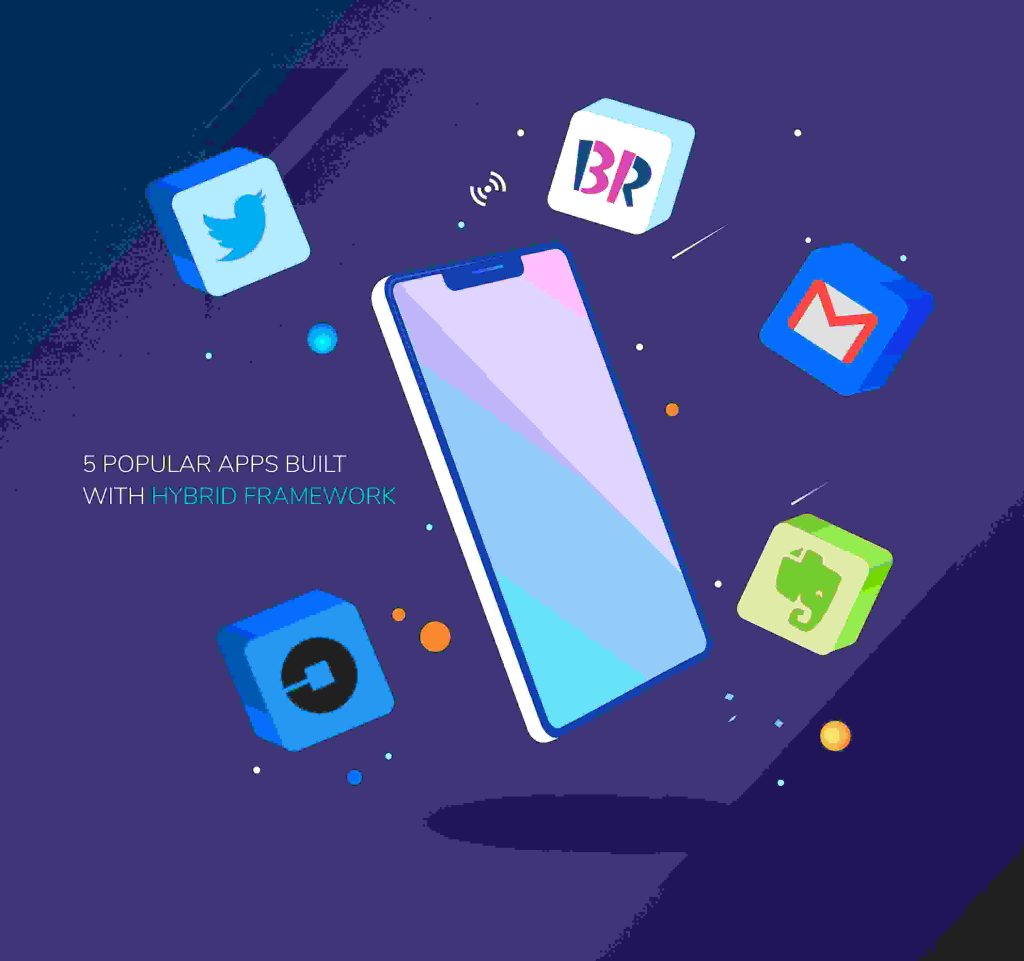
1. Gmail
An app that almost all of us use in our day-to-day life, Gmail, is a wonderful example of hybrid apps. Earlier, it was developed using HTML, which caused some usability issues. Then, Google upgraded it to HTML5. This elevated the user experience of Gmail and introduced several new features and functionalities.
2. Twitter
If you had thought that hybrid apps were slow, here is an example for you. It might be difficult to believe that Twitter is a hybrid app considering a large amount of traffic that this social media platform handles. However, it is true! Twitter has redefined people’s views. It has successfully shown that performance is not an issue for hybrid apps.
3. Evernote
Yet another example that shows that hybrid apps have robust performance is Evernote. Evernote is a productivity app that is popular for its multi-device syncing feature. The app meets this aim seamlessly and provides a versatile experience to its users. It is one of the most loved hybrid apps today.
4. Uber
The app that revolutionized taxi booking, Uber, is a hybrid app. The success of the Uber app can be attributed to its simplicity, easiness, and high performance. It caters to the users of multiple platforms and provides them all an equal and convenient experience. Uber is successfully used globally, and that proves the fluidity of this app.
5. Baskin Robbins
Just like Gmail, Baskin Robbins also combined HTML5 and native features to create an outstanding hybrid app. The app excels in terms of performance and features. One of the most impressive features of the Baskin Robbins app is the offline access it provides. Users can access the app offline on multiple platforms, with the same UI and features!
How Much Does Hybrid App Development Cost
For mobile app development, providing an exact cost is quite difficult. It depends on various factors such as the framework used, the complexity of the app, features to be included, location of the development team, etc.
Hybrid app development is generally less costly than native app development.
On an average, building hybrid apps will take around 200 – 1500 hours.
And the cost of app development may range between $5000 to $50,000 depending on the app requirements.
For mobile app ideas that are complex, like enterprise mobile apps or games, the time of development, as well as the cost, will increase.
How to Find the Best Mobile App Development Company for Hybrid App Development
The best mobile app development company for you is the one that can satisfy all your requirements. Many factors come into play, like your personal preferences, financial limitations, special needs, etc.
With so many mobile app development services available today, you have several options when it comes to choosing a development team.
But make sure to check for these general factors.
- Experience and expertise: Hybrid app development requires sound technical knowledge. Experts with experience in relevant app development will ensure quality output.
- Location: Think of how important location is for you. Would you prefer to work closely with the team, or would you be okay with outsource app development? It helps you narrow down your choices.
- Cost of development: As we saw above, the cost of development varies. Before finalizing a development team, you should discuss the cost and make sure you are in agreement.
- Post-deployment services: Mobile apps will require upgrades, bug fixes, and maintenance. This should be clarified in advance with the developers to ensure the smooth working of the app throughout its lifecycle.
Mindster is a leading mobile app development company with excellent know-how of hybrid app development. We work with several frameworks and languages to develop state of the art applications. Our cross-platform app development services are best in class and widely appreciated by clients globally.
Are you interested in teaming up with us for your mobile app development? Contact us now!
- Agentic AI1
- Android Development3
- Artificial Intelligence38
- Autopay1
- Classified App3
- Custom App Development5
- Digital Transformation12
- Doctor Appointment Booking App14
- Dropshipping1
- Ecommerce Apps40
- Education Apps2
- Fintech-Apps38
- Fitness App4
- Flutter4
- Flutter Apps20
- Food Delivery App5
- Grocery App Development1
- Grocery Apps3
- Health Care10
- IoT2
- Loyalty Programs11
- Matrimony Apps1
- Microsoft1
- Mobile App Maintenance2
- Mobile Apps134
- On Demand Marketplace1
- Product Engineering6
- Progressive Web Apps1
- React Native Apps2
- Saas Application2
- Shopify9
- Software Development3
- Taxi Booking Apps7
- Truck Booking App5
- UI UX Design8
- Uncategorized7
- Web App Development1








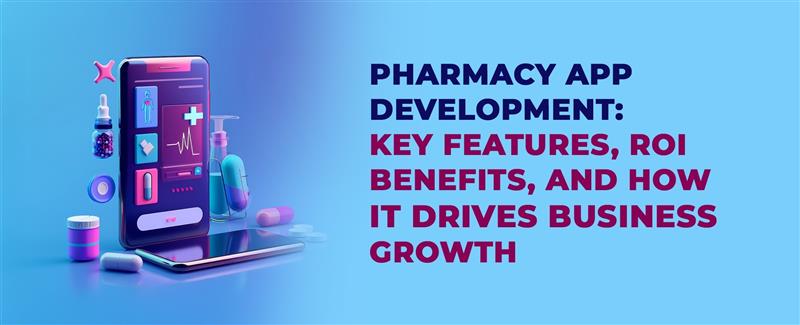


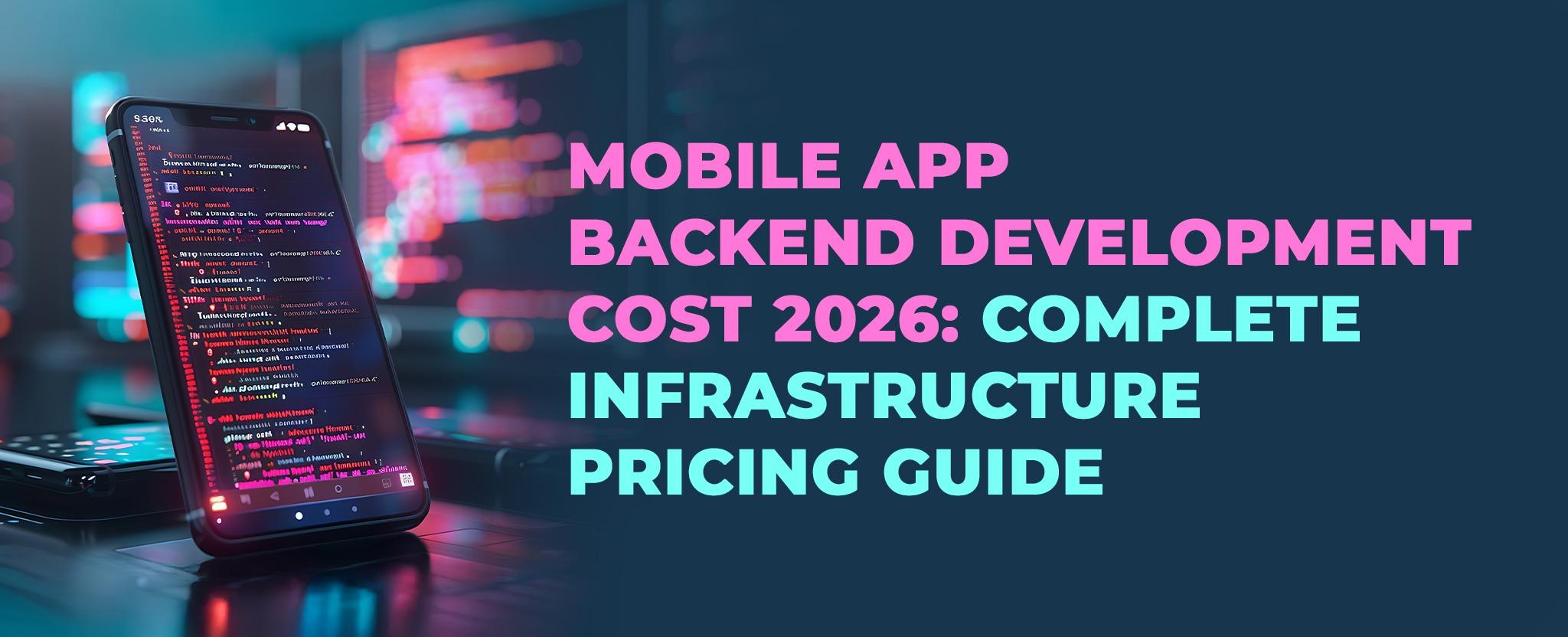






Comments